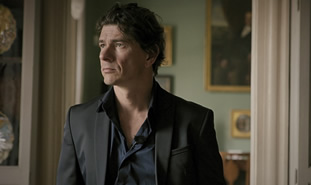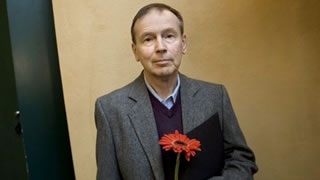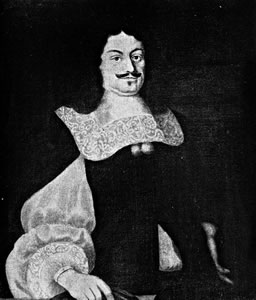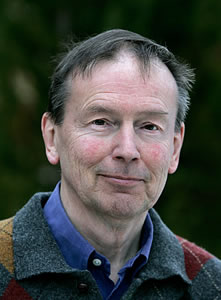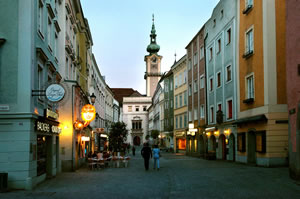De Vlaamse dichter en schrijver Dimitri Verhulst werd op 2 oktober 1972 geboren in Aalst. Zie ook alle tags voor Dimitri Verhulst op dit blog.
Uit: Het leven gezien van beneden
“Tien december is niet de vrolijkste datum denkbaar om in Stockholm een feestje te organiseren, maar daar zal Michail Sjolochov weinig last van hebben gehad toen hij in 1965 deze stad aandeed om er zijn Nobelprijs voor Literatuur op te pikken. Hij wist wat winter was. Hoe het ijs kan kruien staat beschreven in die ene roman waarom hij altijd herinnerd zou blijven, zolang de mensheid tenminste nog iets in boeken wenste te zoeken. En hoewel de wind lelijk huis kan houden op de plaats waar een gulden medaille ongeduldig lag te verlangen naar zijn borst, moet Sjolochovs karakter het ons toestaan te fantaseren dat hij zelfs, eenmaal aangekomen aan de Zweedse scherenkust, ostentatief een jasje heeft uitgedaan om zijn gehardheid als rasechte Kozak te illustreren.
Al zal hij die jas natuurlijk wel hebben aangehouden, enerzijds uit beleefdheid, en anderzijds uit angst dat hij de banketrede, die hij zorgvuldig in z’n binnenzak bewaarde, door deze vestimentaire overmoed kwijt zou raken. Hij, de zogenaamde ‘Leo Tolstoj van het volk’, was voor zijn heenreis in Moskou nog snel even naar de kapper gegaan en had een paar druppels parfum over zijn spoedig uit te beitelen kop gesprenkeld om de prijs in ontvangst te nemen die de echte doch kennelijk minder volkse Tolstoj nooit had mogen krijgen.
Dit was zijn dag. Definitief afgerekend werd er vandaag met zijn sombere jaren als dokwerker, boekhouder, steenkapper, kloefkapper, belastingcontroleur, manusje-van-alles en handlanger-van-niks. Afgerekend, met de konten die hij had gelikt, zich moeizaam een weg naar boven lebberend als journalist. Dat hij met zijn eerste manuscripten had moeten leuren maakte hem in deze stonden alleen maar groter, hij, zoon van een analfabete moeder. En hij voelde met genoegen de woede van al de redacteuren die opeens begrepen dat zij destijds het prille gepruts van een toekomstig Nobelprijswinnaar hadden afgewezen. Het kon niet lang meer duren of zijn tronie zou prijken op een postzegel van vijf kopeken, straatnaambordjes met zijn naam waren al onderweg naar de letterzetter, uiteraard, en alleen het eeuwige leven kon hem nog een staatsbegrafenis ontnemen.
Zuiver toeval was er enkel voor mensen zonder talent. Dat het stadhuis van Stockholm aan het brede water was gelegen had een hogere reden, en die reden heette: Michail Aleksandrovitsj Sjolochov! Rivierenliefhebber in hart en pen, publieke beschermheer van de Wolga en het Baikalmeer.”
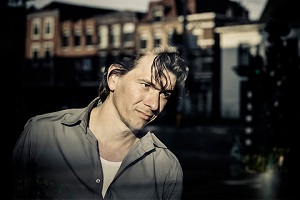
Dimitri Verhulst (Aalst, 2 oktober 1972)
De Nederlandse dichter, essayist, bloemlezer en boekhandelaar Joost Baars werd geboren op 2 oktober 1975 in Leidschendam. Zie ook alle tags voor Joost Baars op dit blog.
ondanks wat ik van Jou
ondanks wat ik van Jou
aan anderen vertel,
Jij houdt Je bij hen weg
zoals Je Je in elk gesprek
aan alle taalweerslag
onttrekt. het is verteld
dat Je een lichaam hebt gehad
dat woorden sprak
zoals ik spreek als ik
met vrienden ben. hoe moeten
wij ooit samen zijn als ieder glas
met hen ten teken staat
van een vertrek?
hoe vindt in ons – dat lege,
ondoordringbare verbond
in ieder stervend woord
dat wij elkaar toespreken –
afzonderlijk Jouw terugkeer
plaats? is dat de vraag?
er loopt een katje in Je rond.
ze lijkt naar iets te zoeken,
houdt dan stil. ik haal haar aan,
maar als ze opkijkt, oogt ook zij
verloren wat ze daar niet vond.
the rustling in the trees is
the rustling in the trees is
not the rustling in the trees.
it is Your voice. the rustling
which is always the same, is not
always the same. it unlocks me,
works its way inside of me, to the
place that is Yours, where You appear
to be absent. that’s where I can hear
Your peaceful livid churning, not
the rustling, but the rustling
that makes the rustling sound,
from a place in me that doesn’t sound,
where the words I speak
don’t exist until You speak,
where You are born in the rustling
of the rustling of the sound-
less rustling and shape me inside.
Vertaald door Astrid Alben
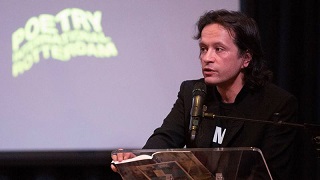
Joost Baars (Leidschendam, 2 oktober 1975)
De Zweedse dichter en vertaler Göran Sonnevi werd geboren in Lund op 2 oktober 1939. Zie ook alle tags voor Göran Sonnevi op dit blog.
Still there is clear, sharp light
Still there is clear, sharp light
April-spring’s
light
Still the sky is being stretched, pale, gleaming
The earth dry, granulous
after the snow
Touch its brittle surface
with the fingers of the
imagination
It is cold Being stretched
within me is a new rhythm
that is far beyond all destruction
For a long time
I have been living among gleaming shadows
in a mother of Hades A wing
breaks out
A leaf, an
oar
Everything is already white
Everything is already delight
The heart of the deep sun
The ache within the heart The breathing
in, in
The sun’s oarstrokes
The quivering water
It is still cold
Still nothing has opened
Still nothing has died
Everything wakes up so slowly
So slowly that we are
almost dying
Come with me, out
An oar-blade stratches your forehead
A sparkling writing of stars
And is
the deep voice of humanity
All language dies out
All language dies so slowly
We will die out completely
Also in the ultimate task
We write in the language of the stars
which is not the language of a human
Vertaald door John Irons
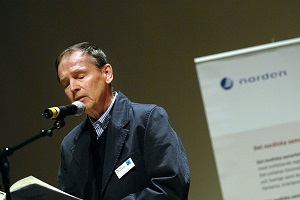
Göran Sonnevi (Lund, 2 oktober 1939)
De Engelse schrijver Graham Greene werd geboren op 2 oktober 1904 in Berkhamsted, Hertfordshire. Zie ook alle tags voor Graham Greene op dit blog.
Uit: Graham Greene: A Life In Letters
“Sunday, Aug. 30 [1954]
[…[
“They believe that the various gods of war & love etc. start winging their way from Africa when the ceremony starts. They had taken about five hours to cross the Atlantic — & on this occasion it was the God of War. A man started staggering & falling & twisting. People held him up, twisted a scarlet cloth round his middle & put a rum bottle & a panga in his hand. Then he began to whirl around the room, falling & tripping & brandishing the axe; we had to leap up on benches to get out of the way. Sometimes he pressed the blunt end of the panga in someone’s stomach, & that man or woman knelt on the ground before him & kissed it, while he sprayed them with rum out of his mouth. Two of those got possessed too, but were quieted by the priest. I was glad when the man gave a shriek & collapsed, & the God had started back to Africa & the party was over.
I like Truman Capote very much. A most queer figure not only in the technical sense. He is telling my fortune & it gives one the creeps because one half believes — there’s an odd psychic quality about him. The fortune depresses me for obvious reasons even though it might be called a happy one. I’ll put it on record.
Between September 1956 & February 1957 I marry a girl 20 years younger who is either Canadian, American, New Zealand or Australian. I am very much in love & she is 5 months gone with a daughter who proves herself a genius by the time she is 18. I see little of my other children. My whole life changes. We have a house abroad by the sea where we are very happy & about the same time I finish (or start) my best book. When I am in the seventies (I remain sexually active till the end!) we spend the summer in the mountains & the winters in the desert. We are very happy, but before we marry I go (in about 2 years time) through a great crisis with myself. Well, there it is — watch out. I’m oddly depressed by it. I want to be with you till death.”
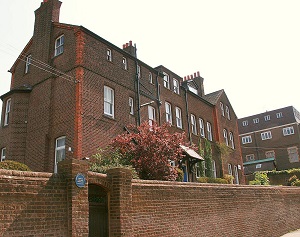
Graham Greene (2 oktober 1904 – 3 april 1991)
Het geboortehuis van Graham Greene in Berkhamsted School, Hertfordshire
De Amerikaanse dichter en essayist Wallace Stevens werd geboren op 2 oktober 1879 in Reading, Pennsylvania. Zie ook mijn blog van 2 oktober 2010 eneveneens alle tags voor Wallace Stevens op dit blog.
Sunday Morning
5
She says, “But in contentment I still feel
The need of some imperishable bliss.”
Death is the mother of beauty; hence from her,
Alone, shall come fulfilment to our dreams
And our desires. Although she strews the leaves
Of sure obliteration on our paths,
The path sick sorrow took, the many paths
Where triumph rang its brassy phrase, or love
Whispered a little out of tenderness,
She makes the willow shiver in the sun
For maidens who were wont to sit and gaze
Upon the grass, relinquished to their feet.
She causes boys to pile new plums and pears
On disregarded plate. The maidens taste
And stray impassioned in the littering leaves.
6
Is there no change of death in paradise?
Does ripe fruit never fall? Or do the boughs
Hang always heavy in that perfect sky,
Unchanging, yet so like our perishing earth,
With rivers like our own that seek for seas
They never find, the same receding shores
That never touch with inarticulate pang?
Why set the pear upon those river-banks
Or spice the shores with odors of the plum?
Alas, that they should wear our colors there,
The silken weavings of our afternoons,
And pick the strings of our insipid lutes!
Death is the mother of beauty, mystical,
Within whose burning bosom we devise
Our earthly mothers waiting, sleeplessly.
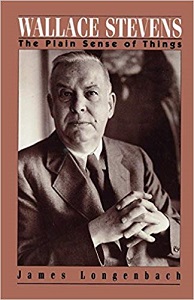
Wallace Stevens (2 oktober – 1879 – 2 augustus 1955)
Cover van een studie over leven en werk
De Nederlandse dichter en kunstcriticus Nes Tergast (eigenlijk Albert Ernest Bruno Johannes) werd geboren in Salatiga, Java, op 2 oktober 1896. Zie ook alle tags voor Nes Tergast op dit blog.
Thuiskomst
Of mij de aarde nog herkennen zal,
Het dorp, het huis, het kleine perk met bloemen?
De oude schimmel van de groenteman
Die ik sinds jaren bij de naam mag noemen,
Zal hij mij nog, als ik hem weer ontmoet,
Begroeten met zijn grote gele tanden?
En zal de merel die naar voedsel zoekt
Dat vroeger werd gestrooid door deze handen,
Maar die mij met dat al nooit heeft vertrouwd,
Niet reeds haar heil hebben gezocht bij andren?
Zullen mijn honden zonder voorbehoud
Weer met mij stoeien en mij niet verbannen
Buiten de sfeer van hun gemeenzaamheid?
En zal mijn spiegel niet zijn zwijgzaamheid
Verbreken en mij openlijk verzaken?
Maar weet, het is dezelfde eenzaamheid
Waarmee, wat grijzer weer, ik aan kom dragen
Als ik voor u de koffer van mijn hart
Ontpak, een koffer vol onzekerheden
Die zijn gewikkeld in dezelfde schemer
Van het verleden, en niet zijn verhard.

Nes Tergast (2 oktober 1896 – 12 december 1974)
Salatiga (Geen portret beschikbaar)
De Duitse dichter en schrijver Andreas Gryphius (gelatiniseerde naam van Andreas Greif) werd geboren op 2 oktober 1616 in Glogau (Silezië). Zie ook alle tags voor Andreas Gryphius op dit blog.
Am tage Nicolai. Matth. 25
O König, der du mir dein pfundt vertravvet,
Gieb das ich embsig, vveil du aussen bist,
Mein ampt versorge: sterck zu aller frist.
Dis zarte fleisch dem stets fur arbeit gravvet.
Ja stevvr dem feinde der nur einig schavvet.
VVie er durch faule knecht, durch blinde list,
Durch grimme macht dir deine kirch vervvüst.
Hilff das durch mich dein vvechsel vverd erbavvet:
Damitt ich entlich in der ernsten stunden
In der du Herr die rechnung hegen vvirst,
Bey deiner ankunft vverde trevv erfunden.
Las mich mitt allen die fur dir bestehen
Zu deiner grosser frevvd o lebens furst
Nach so viel müh, undt harter sorg eingehen.
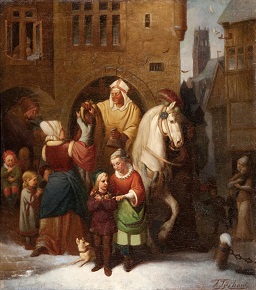
Andreas Gryphius (2 oktober 1616 – 16 juli 1664)
Sankt Nikolaus door Fritz Tüshaus, 1863,Stadtmuseum Münster
De Oostenrijkse schrijfster en literatuurwetenschapster Waltraud Anna Mitgutsch werd geboren in Linz op 2 oktober 1948. Zie ook alle tags voor Waltraud Anna Mitgutsch op dit blog.
Uit: Die Züchtighttps://romenu.blog/tag/waltraud-anna-mitgutsch/ung
“Nach zehn Jahren sagte ich. Gott sei Dank, daß sie so früh gestorben ist, ich hätte mich unter ihrem Blick nie entfalten können. Wenn ich mit meinem Kind in unserem Sommerhaus Ferien verbringe, in dem Haus, in dem ich aufwuchs, siebzehn Jahre lang, bis ich fortging und fünf Jahre nicht wiederkam, sitze ich auf ihrem Platz zwischen Küche und Esstisch. Ich hantiere mit ihrem Geschirr und schlafe in ihrem Bett. Ihre Kleider habe ich hergeschenkt, die Heiligenbilder und den Weihwasserkessel habe ich von der Wand genommen, aber über meinem Bett hängt noch immer die Zeichnung von mir, die ich ihr zu ihren letzten Weihnachten geschenkt habe. Ein junges Mädchen im Profil, das sehsüchtig aus einem Spitzbogenfenster auf eine weite Landschalt hinausschaut. Auf dem Bücherregal steht das Foto das sie als Sterbebild wollte, das in ihren Grabstein eingelassen ist, eine Vierundzwanzigjahrige mit aufrechtem Rücken und aufgetürmtem schweren Haar, Hochmut und Verletzlichkeit in dem zarten Gesicht. Es ist nicht das Gesicht einer jungen Frau. dieses Gesicht hat endgültig Stellung bezogen zum Leben, für dieses Gesicht gibt es keine Überraschungen mehr, ihr habt mich verletzt, ihr werdet wieder tun, ich werde euch keine Angriffsflächen bieten. Es war das erste Jahr ihrer Ehe, das erste Jahr nach dem Krieg, zwei Jahre später war sie meine Mutter. Das ist Bild, das vor mir auftaucht, wenn ich Mutter denke, eine Vierundzwanzigjährige in der Nachkriegsmode mit steifem, unnahbarem Rücken. Später ließ sie sich nicht mehr photographieren. Erst als ich schwanger war, dachte ich wieder an sie. Damals war sie schon viele Jahre tot. Ich schob meinen Bauch durch Supermärkte und verlangte nach Sulz, hausgemachtem Sulz. Ich wachte mit dem Geruch von Surbraten in Nase auf, ich konnte ihren herb-süßen gallertigen Schokoladenpudding zwischen Zunge und Gaumen schmecken.”
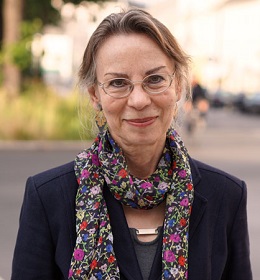
Waltraud Anna Mitgutsch (Linz, 2 oktober 1948)
De Britse (reis)schrijfster en historica Jan Morris werd als James Humphrey Morris geboren op 2 oktober 1926 in Clevedon, Somerset. Zie ook alle tags voor Jan Morris op dit blog.
Uit: A Writer’s House in Wales
“In 1981 the titular Prince of Wales, who has almost nothing to do with the country, and
possesses no house in Wales, was married amidst worldwide sycophancy to the future Princess Diana, at Westminster Abbey in London. It was to be a vast display of traditional ostentation, with horses, trumpets, coped ecclesiastics, armed guards, royal standards and all the paraphernalia of consequence, the whole to be transmitted by television throughout the world. I thought it exceedingly vulgar (besides being romantically unconvincing), and with a small band of like-minded patriots decided to celebrate instead an anniversary of our own that fell on the same day.
Exactly 900 years before, the Welsh princes Trahaearn ap Caradog and Rhys ap Tewdwr had fought a battle on a mountain called Mynydd Carn, and that’s what we chose to commemorate — an obscure substitute perhaps for a televised royal wedding at Westminster, but at least an occasion of our own. We stumbled up that very mountain in a persistent drizzle, and while the entire universe gaped at the splendors in the abbey far away, we huddled there in our raincoats congratulating ourselves upon celebrating a private passion rather than a public exhibition.
Actually national ostentation seems to be gradually going out of fashion even in England. Just as the tanks no longer roll through Red Square on May Day, so formality is fading in royal palaces, even in the most traditionally decorous of them all. I was at a Buckingham Palace reception recently, and when I left I could find no queen, prince or duke to thank for the royal hospitality. I told the policeman at the gate that I had been brought up to say “thank you for having me,” but finding nobody inside the house to say it to, would say it to him instead. “Not at all, madam,” he at once replied, “come again.” Yet if the style of the English monarchy is relaxing, the English nation can neuer be unpretentious. It is too far gone for that. Simplicity is the prerogative of smaller States, and in particular of the minority nations, like Wales, which are not States at all—by the nature of things, grandeur is seldom their style. Patriotism, on the other hand, rides high among them. I dislike the word “nationalist,” which seems to imply chauvinism or aggressive traits, but I respect honest patriotism everywhere, and I have come to think of myself as a minority patriot, a cultural patriot perhaps—one who believes that the characteristics of a people, however insignificant, a language, a tradition, an ideal, are worth preserving for their own sakes.”
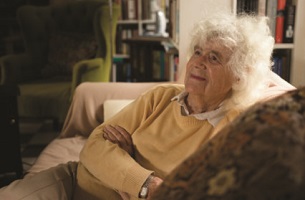
Jan Morris (Clevedon, 2 oktober 1926)
Cover

